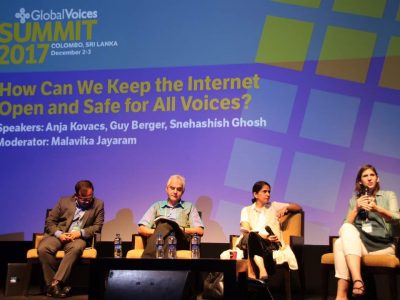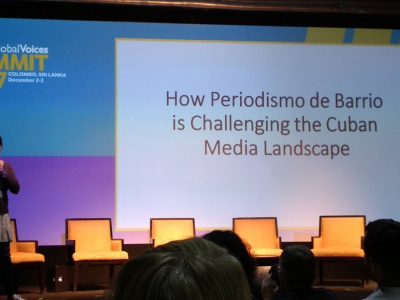Every two years, the Global Voices community assembles somewhere in the world to have three kinds of conversations. We catch up with each other as individuals and friends, sharing wedding and baby photos (and now, thirteen years into our work together, the memories of friends we've lost.) We talk about our project, what we want to accomplish together, the ideas we want to try out and sites we want to launch. And we host a public conversation about the state of the Internet, with a focus on the open internet, freedom of speech and citizen media.
Jump to the start of the opening remarks in our Livestream recording on YouTube »
« View the full list of Summit videos
Eddie Avila opens with the memories of three community members we've lost since we last met in 2015 in Cebu, the Philippines. Anna Gueye wrote about her native Senegal and about activism and African history from her home in the Netherlands. As we remembered her yesterday in our internal meetings, our editors talked about how humbling it was to try to edit the writing of a woman who'd lived so much of the continent's recent history and had firsthand understanding of the continent's stories and context. Gershon Nhdlovu was a brave Zambian journalist who had to flee his country for the UK, keeping up with the politics and struggles of his home country with a radio program and blog, Crosstalk Zambia. Boukary Konaté left us most recently. A remarkable Malian community organizer, he traveled up and down the country, helping people in small villages get online via solar panels and cellphones, sharing stories of rural life with the rest of the world.eé
Our space includes a photographic exhibition juxtaposing the modern technology space we're working within with images of the housing crisis in Colombo, calling into tension the future and present of the nation. There's also a sound installation featuring Global Voices participants speaking about online territories and life on and off the screen.
Jake and Ruhani invite us to shout out as the over sixty countries we represent are read out, and the loudest cheers are for the Maldives (with twenty strong in our 300 person gathering) and, of course, our host Sri Lanka. The opening panel focuses on digital conversations in Sri Lanka. Sanjana Gattulowa, the founder of Groundviews, offers an overview of the media situation in the country. Sri Lanka has the highest literacy in the region (behind the Maldives), but very low media literacy. The result is “a low ability to critique that which we consume.” As a result, rumors take hold quickly. In an environment with a triple-digit growth of smartphones, with more SIM cards than population, there's a diverse and rich blogosphere in Sinhala and Tamil and a rich civic media community. That's helpful, because professional media works mostly in a push more, with very little engagement with readers. What's now shaping the space is the danger of hate, hurt and harm via social media, including a wave of Buddhist extremist nationalism expressed online.
Science fiction author Yudhanjaya Wijeratne offers his “millennial” perspective on the media environment. On networks like Twitter, people are basically shouting into the abyss. On Facebook, the curated experience means it shows you what it thinks you'd like. We used to celebrate Twitter as a space for free speech, but Facebook has so massively outpaced the rest that Twitter is losing relevance. 50% of people wake up with Facebook on their phones, and the view of the world that results is not filtered by journalists, but via confirmation bias. Yudhanjaya warns that the older generation sees what's online as true – they simply don't have filters to process online speech. But he sees filtering as a problem in the US – his American friends won't click links based on ideology – democrats won't read a link from Fox News or Republicans a link from the New York Times. As we learn to filter, we need to be careful about what we filter out.
Deepanjalle Abewardanya focuses on the question of whether Sri Lankan newspapers are meaningfully focusing on reconciliation. Her verdict is that the Sinhala press has been extremely reactive and negative. The Tamil press has been continually discussing issues of land rights, and other post-conflict issues. While there's some hope in papers like the Sunday Times and a new newspaper that is heavy on infographics, most newspapers are missing the opportunity to use the online space as a connective and reconstructive space.
Science writer and new media researcher Nalaka Gunawardena notes that Sri Lankan media is gradually recognizing that online media is the public square of today or tomorrow. “Some journalists are still living in denial, others are genuinely confused,” There's some resentment of the conversational nature of new media – media professionals are not used to audiences talking back. He speculates that less than a third of journalists – and precious few editors – understand what's really going on, and those who do are mostly under 40.
The exciting transition in online media, Gunawardena notes, is the ability to write without consequences. “I test this every week by ridiculing political figures on Twitter”. While there's the ability to speak freely on politics, there are “sacred cows” that can't be spoken about, notably the Buddhist clergy. Write about these topics and you'll be vilified by their defenders. So social media provides these new spaces, but these spaces are often full of intolerance, filled with people whose minds are closed. This powerful online space is in danger of being overrun with fake names and identities, people who don't have the courage to truly speak in public.
Asked to speak about issues of cyberbullying and harassment online, writer and activist Sharanya Sekaram notes that we talk about online violence as something that happens online but not as something that has a presence in the physical world. But threats of sexual violence have real-world consequences. Women take a step back from difficult reporting, and they are shut out of critical conversations online and offline. She notes that Nalaka may feel like he can speak freely online, but as a woman, she feels strongly constrained in terms of what she's able to say online. Not only do we need to teach people how to use online tools – we also need to teach them respect and basic human decency. The violence online is a reflection of the violence we see offline, and educating our children to overcome this violence is critical for offline as well as online spaces. “If you are a racist or a sexist online, you are one offline. We need to find a way to bridge the gap from online to offline.”
Sanjana asks Yudhanjaya what can be practically done in terms of media literacy to ensure we have a population that can critically engage with the media environment they now live in. Yudha explains that when he exited the formal educational system, he hadn't been taught his rights or his history, including the history of the fifty-year civil war that shaped the world he lived in. “How can we affect the world if we don't understand how it came about?” People need a basic understanding of how to perform social intercourse.
Yudha notes that fake news has plagued Sri Lanka for years, even before the terms were identified in the US. But while disinformation used to be the province of powerful state actors, now Macedonian teens are running campaigns as sophisticated as those done by the Kremlin. “If we have enough ad dollars, we can absolutely control what people see.”
Deepanjallee Abewardanya explains that her research agency studies who speaks in parliament and tracks what budget promises are made, and how those promises are carried out. The goal is to provide information that is otherwise inaccessible, holding parliamentarians, media, and others accountable. These platforms end up being gold mines for journalists… but journalists often don't care. Perhaps they don't have adequate training to use these tools.
Moving to issues of gender violence in Sri Lanka, Deepanjallee shows examples where citizen media has forced people to address stories that mainstream media might have preferred not to see. The ability to document events via video means it's harder to deny what's going on.
Nalaka Gunawardena urges people to get involved with online spaces, especially Tamil online spaces. He hopes we can take conversations online and bring them into offline spaces as well. Sharanya tells us we've got to engage with young people in the language they speak, and to ensure there are consequences for hate crimes that take place online.











